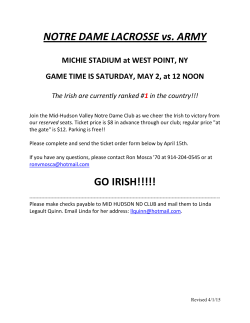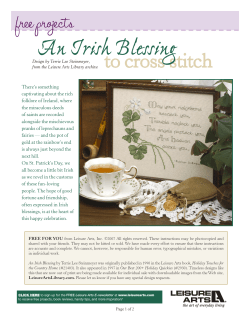
HW10
LGCS 101: Historical Linguistics, Fall 2015 HW10, Final assignment!!!! Due: Wed, May 6. Part 1: Reaction to Wasow 2015 Write up a 1-page (maximum) reaction to Wasow 2015: (a) provide a brief summary of the article, and (b) pick out one issue or question from the article and explain why it is interesting and important, and give an informed assessment of it. Part 2: Irish This problem involves four dialects of Irish—Southern, Western, and two Northern dialects, which will be distinguished as Northern1 and Northern2. In geographical terms, Northern2 is roughly mid-way between the Western dialect and Northern1. The data have been slightly simplified for the purposes of the problem. Cj represents a palatalized consonant—a consonant that has a [j]-like element as a secondary articulation. Cw represents a labialized consonant—one that has a [w]-like element as a secondary articulation. All four dialects represented here descend from a single historical source—Early Modern Irish as spoken in about 1200AD. Your tasks are the following: [1] Reconstruct the Early Modern Irish forms of all the words given. [2] Reconstruct (what you can of) the phonemic inventory of Early Modern Irish. [3] Formalize the sound-changes that operated in each of the dialects to derive the modern forms, inclu ing any crucial orderings. [4] Does the data provide evidence for subgrouping of the dialects? Justify your answer. [5] Is any one of these dialects more conservative (i.e. closer to Early Modern Irish) than the others? Justify your answer. 1 Southern Western Northern1 Northern2 cnoc knok krok krok krok ‘hill’ gnách gnaː graː graː graː ‘usual’ j j j j j j j j imní im n iː im r iː im r iː im r i ‘worry’ tnuh truh truh truh ‘desire’ brat brat brat brat brat ‘flag’ mná mnaː mraː mraː mraː ‘women’ grá graː graː graː graː ‘love’ cros kros kros kros kros ‘cross’ crúigh kruː kruː kruː kruː ‘milking’ snámh snaːv snaːv snaːw snaːw ‘swimming’ gnó gnoː groː groː groː ‘business’ bradán bradaːn bradaːn bradaːn bradan ‘salmon’ j j j j gníomh g n iːəv g r iːəv cniotáil j j fuinneog knitaːl kritaːl w f inoːg f inoːgiː j j siúlóid ʃiuːloːd traːxtaːl noːs j j f inogi traːxtal noːs ʃiuːloːd j j j ‘windows’ j ‘trade’ ‘custom’ noːs ʃiuːloːd j ‘window’ w w f inoːgiː noːs ‘knitting’ f inog f inoːg traːxtaːl j w j nós táilliúirí krital w w ‘act’ g r iːəw j f inoːgiː traːxtaːl fíodóir kritaːl f inoːg tráchtáil amadán j j g r iːəw w w Críostaí j j ʃiuːlod j j j j ‘walk’ j j k r iːstiː k r iːstiː k r iːstiː k r iːsti ‘Christian’ moːraːn moːraːn moːraːn moːran ‘a lot’ amədaːn amədan ‘fool’ amədaːn fiːdoːr j j j amədaːn taːl uːr iː fiːdoːr j fiːdoːr j j j j j taːl uːr iː j fiːdor ‘weaver’ j ‘tailors’ j taːl uːr iː j j taːl ur i j barúil baruːl torann toran toran toran toran ‘noise’ seanfhear ʃan ar ʃan ar ʃan ar ʃan ar ‘old man’ seanbhean ʃan van ʃan van ʃan van ʃan van baruːl j baruːl j j j j j barul j j j j ‘opinion’ j j ‘old woman’ j spalədoːr iː spalədoːr iː spalədoːr iː spalədor i ‘mowers’ pógadh poːgə poːgə poːguː poːgu ‘kiss’ (INF) cogadh kogə kogə koguː kogu ‘war’ pósadh poːsə poːsə poːsuː poːsu ‘marry’ (INF) margadh marəgə marəgə marəguː marəgu ‘market’ taifeadadh tafədə tafədə tafəduː tafədu ‘recording’ ríthe riːhə riːhə riːhə riːhə ‘kings’ tacaigh takə takə takə takə ‘support’ j j j j teith t ehə t ehə t ehuː t ehu ‘flee’ (INF) meastachán mastuːxaːn mastuːxaːn mastuːxaːn mastuxan ‘estimate’ tlú tlu tlu tlu tlu ‘tongs’ tobac tobak tobak tobak tobak ‘tobacco’ 2
© Copyright 2025










